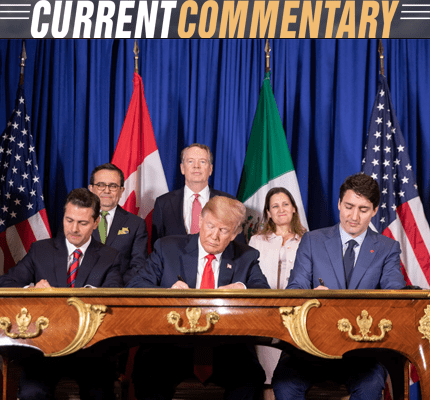
Trump’s Promise to Make America Manufacture Again: USMCA and the Rhetoric of Neoliberal Exception
By Leslie L. Rossman, Ph.D., and Joshua S. Hanan, Ph.D.
Since launching his formal campaign for president on June 16, 2015, Donald Trump has framed himself rhetorically as a nationalist. Building upon nativist themes that can be traced back to the American populist movement of the late 19th century, and the European fascist movement of the early 20th century, Trump’s rhetoric has centered on a commitment to restoring America to what he and his supporters contend are its former days of glory. Numerous commentators, such as contributors to Ryan Skinnell’s edited collection, Faking the News, have observed that Trump’s nationalist rhetoric can be interpreted, enthymematically, as the latest call to increase profit-making opportunities for predominantly white American corporations. Faced with a globally interconnected capitalist economy, one in which formal slavery and overt discrimination based on race have been internationally condemned, Trump has had to articulate his racist and xenophobic prerogatives through a nationalist agenda that works within the complex legal and extra-legal constraints of the present political and economic order.
As an interesting case study for unpacking this premise, we can consider the Trump administration’s embrace of the U.S.-Mexico-Canada Agreement (USMCA). Promoted even prior to Trump’s election as president, and signed into law by the United States, Mexico, and Canada on November 30, 2018, USMCA is a public policy that demonstrates the 21st century tensions between global capitalism and nationalism. On one end of the rhetorical spectrum, USMCA is framed by the Trump administration as an international agreement that will bring America’s “trade relationship with Canada and Mexico into the 21st century.” Yet, on the other end of the rhetorical spectrum, the bill is pitched by the Trump administration as a nationalist policy that secures “a number of wins for American businesses and workers.” How are we to characterize USMCA in relationship to these two conflicting rhetorical poles? Is USMCA an internationalist policy that is consonant with NAFTA and a more general orientation toward global capitalism that David Harvey, and many others, have labeled neoliberalism, “an [international] institutional framework characterized by strong private property rights, free markets, and free trade” (p. 2), or is USMCA a nationalist policy that is aimed at protecting America’s increasingly unstable and vulnerable labor force?
We argue that one way to understand USMCA, rhetorically, is in terms of a logic that Ahiwa Ong has termed the neoliberal exception. Defined by Ong as a practice that “allows for a measure of sovereign flexibility in ways that both fragment and extend the space of the nation-state” (p. 7), the neoliberal exception reveals how economic policy rhetoric in the age of Trump is concerned with foregrounding crisis in order to give as much freedom to American corporations and ruling elites as possible. When beneficial to American corporations, the rhetoric of the neoliberal exception extols the virtues of free market capitalism and defines citizenship in terms of global entrepreneurialism. When threatening to ruling elites, the rhetoric of the neoliberal exception praises government interventions under the pretense of fostering national security for marginalized populations. Both symbolic framings, we argue, come at the material expense of developing countries and the world’s increasingly global underclass.
We can see the rhetoric of the neoliberal exception at work within the text of the congratulatory speech that Trump gave to his supporters and the press on October 1, 2018—the day USMCA negotiations were completed. His opening claim is one that seeks to reinforce his power as sovereign ruler while simultaneously observing that he has long thought NAFTA to be one of the worst trade deals ever to be enacted. He continues his remarks by stating that “since NAFTA's adoption, the United States racked up trade deficits totaling more than $2 trillion, and it's a much higher number than that. With Canada and Mexico, it lost vast amounts of money and lost 4.1 million manufacturing jobs and one in four auto jobs—lost about 25 percent of our auto jobs—even more than that.” These controversial facts and overstated statistics are, in turn, used by Trump to mark USMCA as a significant departure from NAFTA. In contrast to NAFTA, which is framed by Trump as hemorrhaging taxpayer dollars and bad for America’s manufacturing and farming class, USMCA is painted by Trump as good for American taxpayers, especially America’s increasingly marginalized farming and agricultural populations.
When approached critically, however, it is clear that the bill is less dissimilar from NAFTA than Trump’s rhetoric suggests. While touted by the administration as a policy that “will benefit American workers and businesses where [the] North American Free Trade Agreement (NAFTA) has failed, a deeper consideration of the bill, and the governing logics that support it, reveals that its primary aim is to continue the trends of NAFTA by increasing wealth for American corporations and maximizing the exploitation of workers—nationally and internationally. With the exception of new average hourly wages for auto workers, and the loosening of dairy products for export from the United States, USMCA remains unchanged from NAFTA in terms of wages in all other manufacturing industries. Therefore, there likely will not be any protection for the average American worker because USMCA does not extend a wage increase for any category other than auto workers and leaves intact a history of labor exploitation by American corporations—both domestically and abroad. When appreciated from the critical standpoint of the neoliberal exception, it is clear that deregulated markets will continue to be reinforced, when beneficial to the United States, and that labor will remain a secondary political concern. While Trump’s rhetoric communicates an exception to neoliberalism, the bill, in actuality, promotes business as usual, with the added “benefit” of pitting oppressed labor populations in the United States, Mexico, and Canada against one another.
When Trump stated that the new USMCA deal would be more beneficial to the United States than NAFTA had been, and when he bolstered his position by threatening Canada and Mexico with the termination of the trade deal, he did in fact get his desired outcome. However, with all of his “winning,” who actually won? No different than how NAFTA was negotiated to exploit the race to the bottom for cheaper labor sources, USMCA made very few changes to that existing practice, the exception being changes for auto workers. However, the rule is still an advancement of exploitation of labor in all other manufacturing sectors, and an increased ability to exploit workers in developing countries such as Mexico. Therefore, despite Trump’s promise to be a president of the working class, and to bring back manufacturing jobs, his advocacy of USMCA is simply the latest attempt to protect the status quo under the exceptional umbrella of neoliberalism.
References
Harvey, D. (2005). A brief history of neoliberalism. Oxford: Oxford University Press.
Ong, A. (2006). Neoliberalism as exception: Mutations in citizenship and sovereignty. Duke University Press.
Skinell, R. (Ed.). (2018). Faking the News: What Rhetoric Can Teach Us About Donald J. Trump. Exeter, UK: Imprint Academic.
Trump, Donald J. (October 1, 2018). Remarks by President Trump on the United States-Mexico-Canada Agreement. Accessed on February 15, 2019.
Trump Administration. (October 1, 2018). President Donald J. Trump Secures A Modern, Rebalanced Trade Agreement with Canada and Mexico. Accessed on February 15, 2019.



